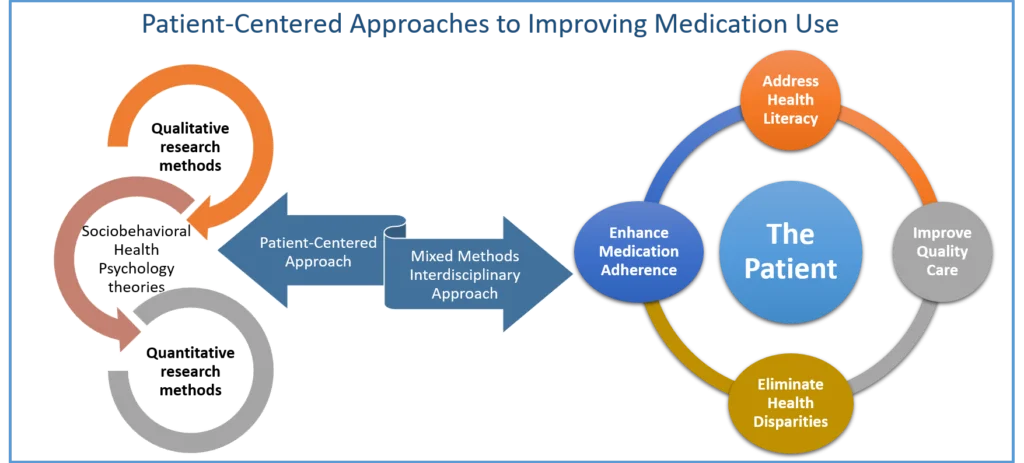
Research
Our Mission
Managing a chronic disease is one of the most difficult tasks patients face. At least one-half of patients do not take their medicines properly or as recommended by their healthcare provider. This problem leads to poor health outcomes, higher healthcare costs, and even death. Unfortunately, solutions to this problem among marginalized populations such as persons with limited health literacy, chronic diseases like diabetes, and communities of color, are lacking.
The Shiyanbola Research Group strives to advance healthy communities by understanding barriers to medication use and adherence, assessing challenges with the management of diabetes and related chronic diseases, and design novel tools and interventions that improve health outcomes. We do this in cooperation with patient, community, academic, and clinical stakeholders.
Our Research Entails
- Using patient and stakeholder perspectives to understand barriers to medication use and chronic disease self-management among various marginalized populations
- Examining interdisciplinary approaches to address health literacy and equity gaps in medication use, pharmacy practice, and patient care
- Developing new measurement tools for providers and researchers to advance their science and practice
- Designing and implementing novel behavioral clinical trials and interventions to improve diabetes and other related chronic disease outcomes
- Using mixed methods approaches to assess, design, and implement educational, behavioral, community-based, and clinical interventions
Core Focus Areas
- Core 1: Diabetes and Related Chronic Diseases among Underserved Populations
- We study diabetes self-management in diverse marginalized communities. We develop and implement novel tools and interventions that reduce diabetes outcome disparities in community, pharmacy, and clinical settings.
- Our team has developed and conducted the initial testing of a culturally adapted tool that assesses illness perceptions of African American/Black patients with diabetes. The tool included unique sociocultural influences that often affect perceptions of diabetes in these communities.
- Using a community-engaged approach, we developed and implemented Peers LEAD, our novel intervention to improve medication adherence among African American/Blacks with type 2 diabetes. We are currently testing a newer version of our intervention that incorporates Peers LEAD into an existing widely disseminated diabetes self-management program called Healthy Living with Diabetes. This is called Peers EXCEL.
- Core 2: Medication Use and Adherence
- Our team focuses on longitudinal evaluations of medication adherence outcomes and pharmacy- and community-based interventions to improve medication use and adherence. We are evaluating how medication adherence outcomes change over time and exploring how psychosocial and interpersonal factors impact medication adherence changes.
Explore related projects
- Feasibility and Acceptability of a Pilot Culturally Specific Educational-Behavioral Intervention for African Americans with Type 2 Diabetes
- Peers EXCEL: Improving Diabetes Programs for Blacks in Wisconsin: Peers as Coaches in Medicine Use
- Peers LEAD
- Predictors of Changes in Medication Adherence Overtime among Black patients with Diabetes: A Mixed Methods Study
- Core 3: Health Literacy and Health Equity
- Using a community-engaged approach, we conduct studies that address health literacy and health equity for diverse, marginalized populations. We have developed and implemented a pharmacist-led intervention that focuses on addressing health literacy and its associated psychosocial factors in a clinic setting.
Explore related projects
Active Grants
- Enhancing diabetes maNagement with phaRmacIsts and Community Health workers (ENRxICH)- NIH/NIDDK-funded 5-year study 1R01DK136690-01
- AHRQ 1R01 HS029477-01
- Healthy Living for You - NIH/CTSA UW Institute of Clinical and Translational Research (Stakeholder and Patient Engaged Research Pilot)



